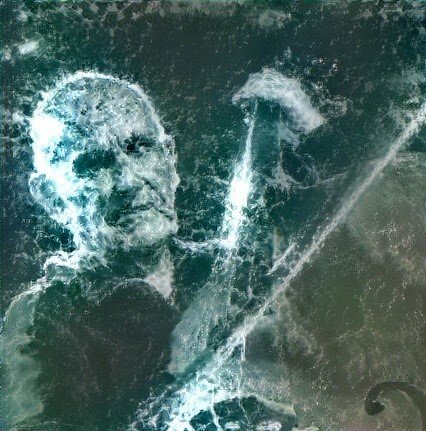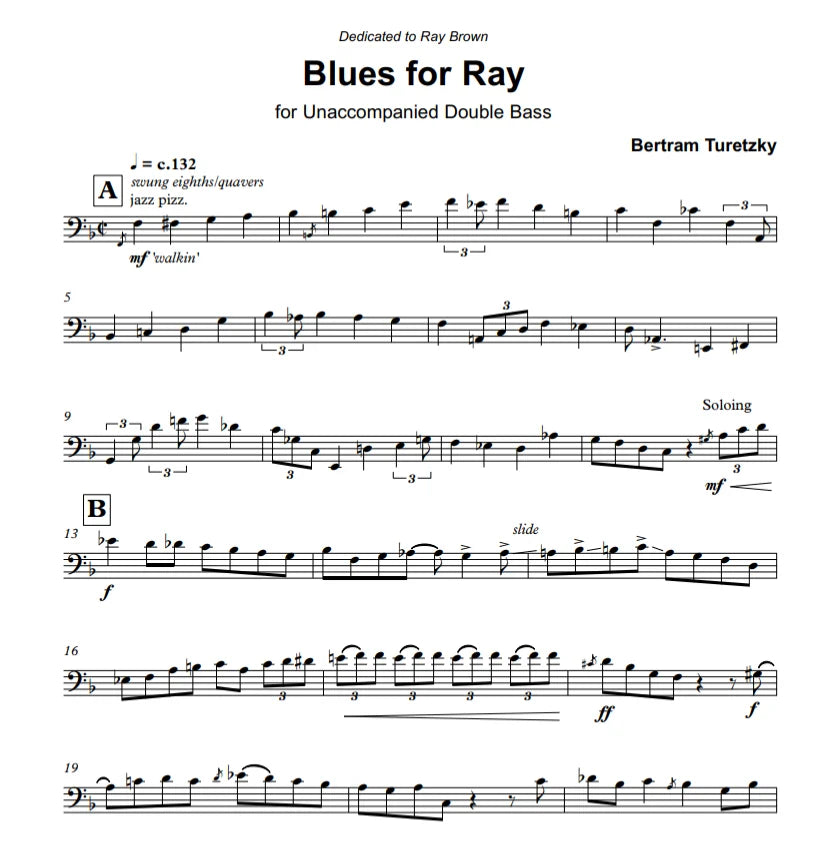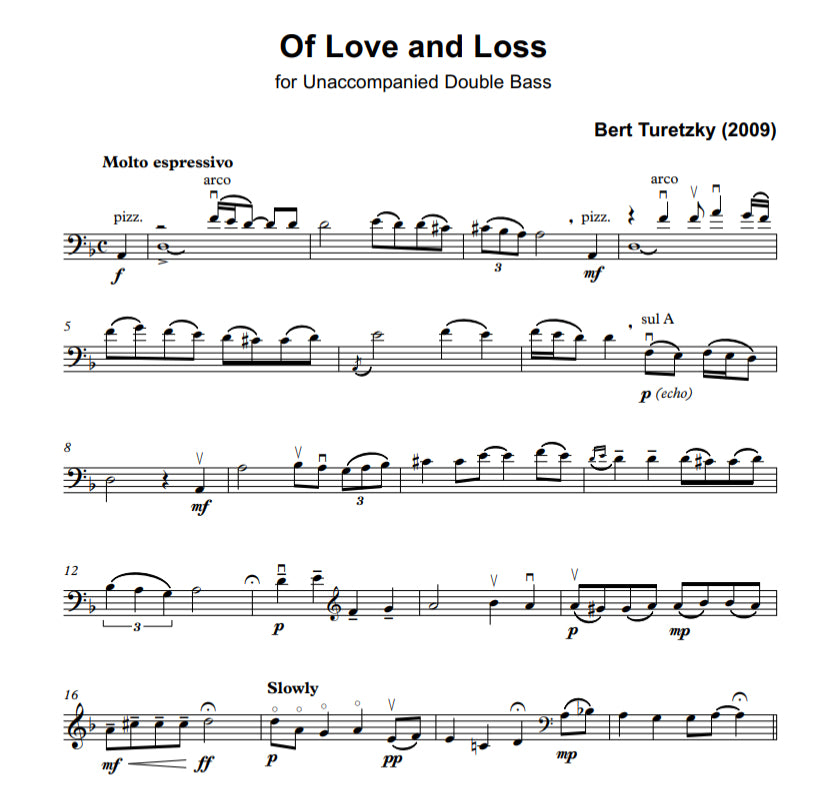David Heyes
Bertram Turetzky: Celebrations Book 6: Seven Pieces for Unaccompanied Double Bass
Bertram Turetzky: Celebrations Book 6: Seven Pieces for Unaccompanied Double Bass
Couldn't load pickup availability
About the Collection
Celebrations Book 6 brings together seven pieces for unaccompanied double bass by the legendary American bassist Bertram Turetzky. Aimed at the intermediate bassist, these inventive, evocative, and colorful pieces are ideal as both study and recital repertoire.
Bert Turetzky exploits and explores a wealth of colors, textures, and timbres available to the contemporary double bass, including two jazz pieces played pizzicato, always within a lyrical framework, creating music that offers musical and technical challenges in equal measure.
Table of Contents
3 Short Pieces for David
1. Basically Baroque - This collage should be played in a lyrical style bringing out the quality of each little excerpt.
2. Romance - This love song should have a 'night music' vibe. Articulations and dynamics are up to the performer.
3. Finale - Chopsticks are the sound generators for this movement. The first section is played 'below the bridge' - the proper string utilized is notated by where it 'sits' on the staff. The second section is played 'on the string' with a sense of swing. The third section (the poem) should start immediately after the last note of the second section. This poem should be delivered with a sense of fun. When finished, pluck the G and D strings with your left hand and simultaneously pluck the A and E strings with your right hand, thus producing a LARGE SOUND. Your arms will end up extended in a bow - be careful not to drop the Bass!
[Performance notes by Bert Turetzky]
Premiere
3 Short Pieces for David was premiered on Sunday, 30 September 2018, at the Garden Gallery (Farnham, Surrey) by David Heyes (double bass).
Pacific Parables
Pacific Parables is rhythmic and energetic, employing a number of sounds and effects to create mood and atmosphere in a work of great character and imagination. Suitable for any audience or occasion, Pacific Parables is both player and audience friendly. Bert Turetzky writes: "Living in close proximity to the Pacific Ocean has changed my life. Fascinated by the different cultures, different folklore, and especially the different cuisine of the Pacific Rim peoples. As a result, it is no surprise that this piece "just happened.”
Of Love and Loss
Of Love and Loss is a work of great imagination and spirit. Written in a traditional and tonal idiom, there is great scope to create a wonderful atmospheric soundscape and explore the many colors and timbres of the solo double bass. The piece is both player and audience friendly and offers much to the inventive and enterprising bassist.
Bert Turetzky writes: "I wrote this piece in memory of my mother Taube Feldman Turetzky (1904-1997). Her tales of walking across Europe to get on the boat to New York have resonated in my memory for many years. Then one day, in a recording session, I was asked to play a solo, and an early version of this piece happened. Since then, I have edited and polished the piece, and here it is for your delectation."
Of Love and Loss received its UK premiere at St. Paul's Church, Clifton (Bristol, UK) on Sunday, 14 June 2015, by David Heyes (double bass)
Blues for Ray
Blues for Ray is dedicated to jazz bassist Ray Brown and is played pizzicato throughout. There is scope for optional improvisation, contrasting solo and accompaniment figures, and a range of pizzicato techniques and approaches can be employed to create a ‘cool’ piece that is suitable for any audience or occasion.
Hat Tippin’ Blues
Hat Tippin’ Blues is played pizzicato throughout and is a colorful and inventive solo that ventures occasionally into the higher register of the double bass. A slow introduction leads to faster music which is fun, vibrant, and fizzing with energy and excitement.
About the Composer
Born on 14 February 1933 in Norwich, Connecticut, Bertram Turetzky took up the tenor banjo at the age of 12 or 13. He switched to the guitar in high school, falling in love with jazz, and then changed to the double bass, which he described as '...the core of everything, the glue between the harmony and the wind instruments.'
He subsequently studied at New York University and Hartt College of Music of the University of Hartford and slowly changed direction from jazz to everything else a bassist is asked to do - symphony, opera, contemporary, jazz, teaching, and recitals, featuring many of the new works that were being written for him. For many years he combined his hectic performance schedule with teaching, first at the Hartt School of Music and from 1968 as Professor of Music at the University of California, San Diego, where he retired as 'Distinguished Professor Emeritus' only a few years ago.
Alongside his passion for contemporary music, Bert has also played a wealth of music from the 15th and 16th centuries. He has transcribed works for every possible combination of instruments, usually including the flute, which was always played by his wife Nancy, and the husband and wife partnership has been fearless in their promotion of music for this rare instrumental duo. The vast majority of repertoire for flute and double bass today was either written for Bert and Nancy or inspired by them. Bert has an interest in any repertoire which features the double bass and has championed many chamber works which are unknown or have been forgotten.
Bert has composed and transcribed many works for double bass. For some years, his interest in the music of Domenico Dragonetti (1763-1846) was a passion, and in the early 1960s, he edited six waltzes for unaccompanied double bass by the great Venetian bassist. Although Bert Turetzky has spent most of his life playing modern music and creating every possible sound and noise that the double bass can produce, his own compositions, on the whole, are far more traditional and accessible. He has composed a whole range of music for double bass, probably for his own use or for his students, and into his 80s, the desire to compose and perform is as strong as ever. [David Heyes/June 2015]







